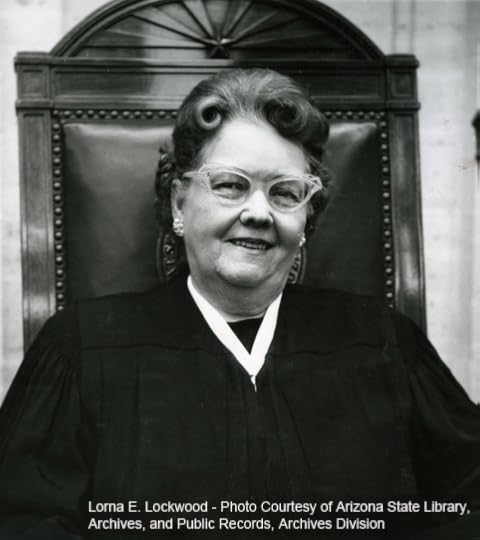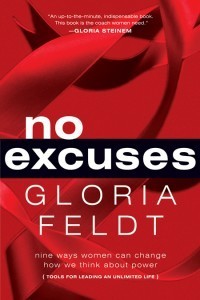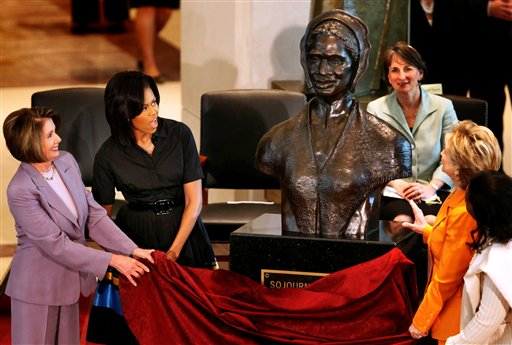Gloria Feldt's Blog, page 20
March 19, 2012
Lesser-Known Women Often Make History

In the spirit of the month, here are links to articles drawing attention to women you may not have heard of—and the awesome things they are doing today.
Anna Clark has compiled a list of underrated women writers of novels, stories, poems, and graphic novels from around the globe.
The BBC has profiled some of the women activists involved in Syria's uprising.
Bitch Flicks recommends 11 films about trailblazing women.
Houston Press lists ten of their favorite Female Artists making music today. Rock on ladies!
To learn more about women from the past who may have slipped your radar, check out the accomplishments of these interesting women. Here's to preventing their loss in the sands of time!
Lorna Lockwood: the first female Chief justice of a state supreme court. (I am especially proud of this one, as an antidote to what's happening to women's rights in Arizona today!)
Aemilia Lanyer: proto-feminist Renaissance poet and an eloquent apologist for the dignity of women. Check out "Eve's Apology in Defense of Women" excerpted from her poem Salve Deus Rex Judæorum
Sarah and Angelina Grimké: 19th century writers and educators, early advocates of the abolitionism and women's rights movements in the United States.
Click the links, and enjoy the feast of accomplishments by women you might never have heard of—but should have.
Pass this post along to your friends and family. And add your own favorite lesser-knowns in the comments section. Together, we can give women's history its due.
March 16, 2012
Aung San Suu Kyi Says Value Change Over Regime Change
"Regime change can be temporary, but value change is a long-term business. We want the values in our country to be changed."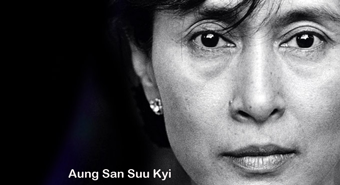
As a contemporary figure making women's history, Daw Aung San Suu Kyi reflects the kind of 'power-to' leadership which is truly earth shattering.
"Regime change can be temporary," she says, "but value change is a long-term business. We want the values in our country to be changed. "
Winner of the Nobel Peace Prize in 1991 Daw Aung San Suu Kyi is the leading pro-democracy opposition leader in Myanmar, formerly known as Burma, one of the world's most isolated and repressive nations.
Since a military junta grabbed power of the country in 1962, it has secured its power by rigging elections and suppressing opposition. Ms. Aung San Suu Kyi spent 15 of the last 20 years under house arrest after her party, the National League for Democracy, won an overwhelming victory in the 1990 elections but was denied power. In November 2010 elections, Myanmar's main military-backed party won in a vote again engineered to assure the military's continued grip on power. The National League of Democracy boycotted this election and called it what it was—undemocratic.
Ms. Aung San Suu Kyi—who was released from house-arrest November of 2010—and her party, the National League for Democracy, have chosen to participate in elections this time around. On April 1 of this year, Suu Kyi and other pro-democratic candidates will run for 47 of the 48 open seats in Parliament.
Her campaign speech, which will appear on National TV, will mark the first time the Nobel Peace laureate has been given the opportunity to use state media to promote her party's platform. She calls for amending the 2008 constitution, which was drafted with the army's guidance. She boldly criticizes its automatic allocation of 25 percent of the parliamentary seats to unelected representatives of the military.
Some critics worry that Ms. Suu Kyi's oppositional message will be tainted as she moves forward, vying for a place within a political system that imprisoned her for fifteen years. Perhaps, but her brave movement from outsider criticizing the way her country is being run to insider willing to get her hands dirty and propose solutions from within the system gives her a rare chance to make the lasting values change she seeks.
The popular desire for democracy is undeniable in Myanmar. Ms. Suu Kyi has long represented the possibility of a more socially just society. If elected, she favors repealing repressive laws, ensuring the judicial system is independent, allowing full freedom of the media and expanding the network of social assistance in Myanmar to include legal aid.
On this day in Women's History Month, Aung San-Suu Kyi, stands among the likes of historical leaders of democratic and non-violent resistance movements such as Martin Luther King, Jr., Nelson Mandela, and Mohandas Ghandi, as she relentlessly organizes to bring about her vision of a freer society in Burma.
Whether she wins the election or not, she has made history.
March 15, 2012
From Olympe de Gouges to Women Demanding Rights Worldwide
"A woman has the right to mount the scaffold. She must possess equally the right to mount the rostrum [speaker's platform]."
Olympe de Gouges was an 18th Century French playwright and political activist way ahead of her time, and her feminist and abolitionist writings stirred political discourse in ways that presaged uprisings by women around the world last week.
Disenchanted when equal rights were not extended to women after the outbreak of the French Revolution, Olympe de Gouges wrote a Declaration of the Rights of Woman and the Female Citizen. Modeled on the 1789 Declaration of the Rights of Man and of the Citizen by the National Assembly, De Gouges' Declaration echoed the same language, replacing 'Man' with 'Woman'.
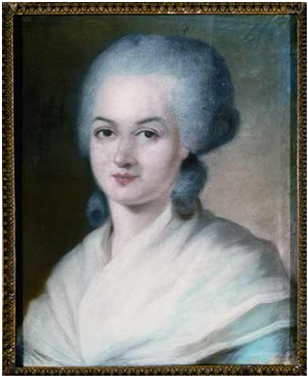 De Gouges argued that the rights revolutionaries were attempting to expand for men should be extended to women as well. She passionately insisted upon universal suffrage, legal equality in marriage, women's right to divorce in cases of abuse and her right to property and custody of her children, among other things. In her postscript, Gouges exhorted women to awaken to consciousness of their rights to embrace their power. She encouraged them to step up, take action and demand equality.
De Gouges argued that the rights revolutionaries were attempting to expand for men should be extended to women as well. She passionately insisted upon universal suffrage, legal equality in marriage, women's right to divorce in cases of abuse and her right to property and custody of her children, among other things. In her postscript, Gouges exhorted women to awaken to consciousness of their rights to embrace their power. She encouraged them to step up, take action and demand equality.
Sound familiar?
Stepping up is just what women in Egypt were doing last Thursday, March 8, as they marched from the Journalists' Syndicate to parliament. The rally, organized by 16 feminist NGOs, came together around the demand that women make up 50% of the constituent assembly in parliament. In the 2011 lower house elections, only 2% of the 508 seats in Egypt's parliament were allocated to women—even though women were prominently, and courageously, involved with the Tahrir Square uprising.
Egyptian human rights lawyer Ragia Omran explained, "Personal status laws, which refer to women's rights in divorce for example, need to be changed in the next constitution". She added that this would be more likely if there were more women involved in its writing.
Egyptian women were not the only ones to take their demands to the street last Thursday. Women in Fiji, the Maldives, California, Canada and Israel called to public attention everything from police brutality to sexual assault to women workers' rights.
Though their national situations and particular demands were inevitably varied, the female demonstrators of last Thursday all had one thing in common. In taking to the streets, they cemented the place of their voices, concerns and needs within the public dialogue.
The movement toward true equality under the law continues as it always has, with intermittent backslides as well as positive developments. It is heartening to know that there have always and will always be women who insist upon raising their political voices, who make known their visions of a more equal society, and who are willing to take the action necessary to make it happen.
March 14, 2012
She's Doing It: Jen Nedeau and the Joy of Media
Are there generational differences in women's relationship with power?
When I started writing No Excuses, I wanted to interview young women in their 20's to learn about their relationships with power. Media relations professional and digital strategist Jen Nedeau, then 24, brought together several of her friends for a frank and far reaching conversation.
Jen, who seems to have been born knowing her power, blew me away with her poise, sense of balance, and that power of intention that many women of all ages need to be urged to pursue. See what I mean in her update—she must keep those power tools in her purse, because she uses them so proficiently to deal with the ups and downs of life. (As befitting a digital strategist, you can follow Jen on Twitter @JenNedeau.)
Gloria Feldt: In No Excuses, I asked, "When did you know you had the power to_____?" What have you learned about your power to ______ during the past year or so?
Jen Nedeau: When I spoke to you for the book, we talked about finding the "power source. " For me, few experiences have been more profound in discovering my own source of power than the past three years I've spent in New York. Since moving here, I watched a company I once worked for go bankrupt, I've been robbed three times, lived with far too many random roommates and I had to stare down an army of cockroaches on a regular basis in my old apartment in the Lower East Side.
I would definitely say that I had to employ Power Tool #5: Carpe the Chaos on a regular basis.
But if the company I worked for hadn't gone bankrupt, I probably would not have started my own consultancy and secured a variety of clients in the arts, media and non-profit worlds—proving to myself that I could make it on my own—before taking a job with a major magazine publisher. After two years of living here, I was able to move out of my cramped apartment in the Lower East Side and into a studio apartment, which I am glad to say is thus far, free of Manhattan's favorite pests.
All of these challenges, big and small, helped me learn that I have the power not only to survive life's challenges, but succeed despite them. Now, at age 27, I can say that even a bit of struggle can reap big rewards. I am enjoying my life here, meeting amazing people and working on interesting projects, but more importantly, I know that no matter what happens, I have the ability to make it on my own. And independence, in any form, is one of the most empowering tools in the toolbox.
GF: Was there a moment when you felt very powerful recently? Was there a moment when you felt powerless?
JN: I draw in my energy from those around me, so it is important for me to make sure I am always surrounded by ambitious and adventurous people. In the past year, I've worked hard to put my network into action by bringing together a group of bright, exceptional individuals through regular events and dinners.
Most of the time these people do not have a previous connection to one another and I love to see them build relationships that help them to fulfill their dreams. It is a powerful feeling to be able to fill a room with dozens of people who believe that in order to create a better world, sometimes we first need to create a more connected one.
GF: Which of the 9 Ways Power Tools have you used or do you particularly resonate with?
JN: Beyond Carpe the Chaos, which seems to be a constant in the big city, I would say that given my work in communications and journalism I resonate with Power Tool #8: Employ Every Medium and Power Tool #9: Tell Your Story. Particularly in this digital age, I am always trying to learn, observe and employ new ways of communication.
From my days as a women's rights blogger to my current job, I have found a lot of joy and power in the new media platforms that exist and I love to see how they help to elevate voices from every corner of the world. In my opinion, the digital era has made the power of storytelling even more potent.
GF: For the first time in history, gender parity at work, in civic life, and in personal relationships seems possible—if we choose to make it so. That's my take. What's yours? What are the signs that tell you I'm right, or that make you think I'm overly optimistic?
JN: Like you, I am also an optimist, so I want to say that it is getting better, but of course there is always room for improvement. One thing I think women need to work on is to try and be aware of the pressure they put on themselves to do it all and be everything to everyone. I hope that as women continue to work toward equality in the workplace and at home, they don't also bury themselves in pursuit of perfection.
GF: What other observations about women's relationship with power or leadership do you want to share?
JN: Women shouldn't be afraid of power, but embrace it – both the power that lies within and the power the exists around you. Of course, this is much easier said than done, but it is an important step.
March 8, 2012
Loretta Lynn, The Pill, and Family Planning: Happy International Women's Day!
Just in time to celebrate International Women's Day, Catherine Eng contributes this blog post that celebrates a medical solution to family planning that many take for granted and yet remains out of reach 52 years later to millions of women around the world.
Country music legend Loretta Lynn was known for lyrics that bluntly addressed issues in the lives of many women. She believed no topic was off limits, as long as it spoke to other women.
In 1975, Lynn released The Pill, a single considered to be the first song to discuss birth control. The song tells a story of a wife who is upset about her husband getting her pregnant year after year, but is now happy because she can control her own reproductive choices. The song's frank discussion of birth control was unprecedented at a time when many would have considered contraception a risqué subject matter. Some radio stations refused to play her song on these grounds.
"There's gonna be some changes made right here on nursery hill…'cause now I've got the pill."
Be sure to click on the video link below to listen and laugh.
In an interview later in life, Lynn recounted how she had been congratulated after the song's success by a number of rural physicians, telling her how The Pill had done more to highlight the availability of birth control in isolated, rural areas, than all the literature they'd released.
Fifty-two years after the inception of the pill in America, conservative newscaster Rush Limbaugh felt free to call Sandra Fluke, a Georgetown university student who asked her university to cover hormonal birth-control, a prostitute and a whore. His ignorant comment reminds us that there still exist widespread misconceptions and stigmas surrounding contraception. Let's take the opportunity on International Women's day to clear up any misconceptions, to examine the many social benefits of contraception and family planning.
There exist 215 million women around the world who want contraception and HIV prevention services, but have no access to either. If all the unmet need for contraception were met, the result would be 94,000 fewer women dying of pregnancy complications each year, and almost 25 million fewer abortions each year. Nicholas Kristof, columnist with the New York Times, sees voluntary family planning "as a cost-effective strategy to reduce poverty, conflict, and environmental damage" worldwide. Providing family planning is a win for all–women, men and the planet.
On International Women's day, lets take inspiration from Mrs. Lynn and use our voices to insist upon greater public knowledge about contraception—how it should be used in its different forms as well its multifold benefits. Only when stigmas are conquered will a world in which contraception and family planning are available to all be possible.
"You've set this chicken one last time, cause now I've got the pill."
About the Author: Catherine Engh is a feminist and an aspiring writer particularly interested in the ways that girls and women are represented in fiction and television. She wrote this piece for 9 Ways.
March 7, 2012
She's Doing It: Philactivist Barbara Lee Sparks Power of Intention
Yes, I made up "philactivist." But what else do you call someone who combines philanthropy with political activism in a unique way, driven by her power of intention. Barbara Lee is one of the women I profiled in Elizabeth Warren who is widely credited for the original thinking, political courage, and relentless persistence that led to the creation the Consumer Financial Protection Bureau and is now running for the U.S. Senate in my home state of Massachusetts.
March 5, 2012
Your Invitation to The No Excuses "Power To You" Virtual Book Tour
I'm celebrating the paperback release of No Excuses: Nine Ways Women Can Change How We Think About Power and most cordially invite you to join me on my No Excuses "Power To You" Virtual Book Tour.
There are two ways you can participate in an in-person chat with me about the book:
You can organize a chat for your blog readers (if you have a blog) and/or social media followers and friends. Or,
You can invite your followers, friends, and yourself to my Facebook videochat on Sunday, March 25 at 3pm eastern time, 2pm Central. 2pm Mountain, noon Pacific, and you know the rest.
To schedule a book chat with your blog readers and social media followers (or to request a Q&A with me or a review book if you want to do a review instead or in addition to), check out the following form to let me know your preferences.
Leap Day 2/29/12 was the perfect day to talk about women in power and announce to the world that No Excuses is now out in paperback, complete with a NEW discussion guide in it especially for book groups. Now during March, be sure to check out the 9 Ways Blog frequently in March for Women's History Month posts that will inspire and surprise you–and I hope will tempt you to join the conversation with your comments and social media shares.
Perhaps you saw my ForbesWoman.com post "What's the Next Great Leap for Women?" What's your thought? And how can women take advantage of this moment to embrace power and leadership authentically, and reach parity in politics, at work, and in personal relationships?
We'll discuss all this, give you tips for life and leadership that you can use right away from among the 9 No Excuses Power Tools– and more. (In the video linked here, I talk with Claudia Chan about Power Tool #6: Wear the shirt.
Plus there will be special giveaways for participating blogs, and chances for chat participants to win copies of No Excuses and yummy Equali-Tea from the Kitchen Herbalist (aka Linda Bosse, my daughter). Look for more surprises yet to be announced.
Remember, to schedule a book chat with your blog readers and social media followers, join up for the Facebook videochat, or request a Q&A or book review, sign up and tell me how I can help you get started via this form.
I'll promptly send you further information and materials you can use to promote the event of your choice. See you around the virtual campus real soon, OK?
And PS, if you're in NYC here's a reminder invitation to the SeeJaneDo Soiree into Action Monday 3/5 at 6:30 pm where I'll be sharing some of the No Excuses Power Tools–I'd love to see you in person as well as online 
About Gloria Feldt:
Gloria Feldt is the author of No Excuses: 9 Ways Women Can Change the Way We Think About Power. Interested in learning more tips and power tools that have worked for other women? Buy the book here . Engage Gloria for a Speech or Workshop here .
March 2, 2012
What's The Next Great Leap For Women?
You can now find me on ForbesWoman.com. My first post will tell you why it took me so long to get started. And now that I've jumped into the deep end of the pool, I want to share what I think is the Next Great Leap for women. I'd love to know what your thoughts are. Victoria Pynchon has already weighed in with an amazing piece about sponsorship.
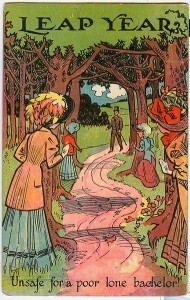 Because my book, No Excuses: 9 Ways Women Can Change How We Think About Power, came out officially in paperback on Leap Day—a perfect day for a book about women's relationship with power, no?—I've been thinking hard about what the next great leap forward for women should be. So I thought I'd better check out the history of the every-fourth-year calendar adjustment that gives us February 29.
Because my book, No Excuses: 9 Ways Women Can Change How We Think About Power, came out officially in paperback on Leap Day—a perfect day for a book about women's relationship with power, no?—I've been thinking hard about what the next great leap forward for women should be. So I thought I'd better check out the history of the every-fourth-year calendar adjustment that gives us February 29.
Watch Out, Men
Leap Day inspired a leap of vision and blazing hope for women in 5th Century Ireland when St. Bridget persuaded St. Patrick to declare a woman could do the unthinkable: ask a man to marry her.
At a time when a woman was, for all practical purposes, owned first by her father and then by her husband, marriage meant not love but economic survival for her and her children. No doubt many seized their one chance to override gendered power norms and choose their own fates.
The tradition continued, with merry belittlements to remind women how little power they had the rest of the time. Men had to pay a fine or give a silk dress if they refused marriage proposals. Women on the prowl for husbands sported red petticoats as warning so poor beleaguered men could dash in the other direction. Haha.
You may be laughing because Leap Day privilege now seems an amusing anachronism. Not only do the majority of men and women think it's perfectly fine for a female to propose marriage, the End of Men has been proclaimed, Women's Nation declared, and New York Times columnist Nick Kristof dubs women "Mistresses of the Universe."
But such puffery masks how far women have yet to go to achieve genuine parity. The next norm-changing leap must be women creating and earning wealth that places the female 51 percent of the population into power balance with their male counterparts.
Effective leadership and actions that create fundamental social change are rooted in the language of power, of which wealth is a key source. If women are ever to complete their staccato journey to equality, they must join that discourse with full throat.
The dismal data are well known. Women in the U.S. have been stuck for decades at a paltry 18 percent of the top leadership positions across all sectors, on average. Currently, that's 17 percent of Congress, 15 percent of Fortune 500 corporate boards, a mere 3 percent of top clout positions in media companies that define the cultural narrative. Far from being mistresses of the universe, women earn 78 cents to a man's dollar, and yes, that's for comparable positions and with comparable experience.
The saints won't intercede this time; indeed the social positions of the political right have hardened to 5th century proportions, making the phrase "barefoot and pregnant" relevant again. Catholic Bishops' would deny even non-Catholic employees birth control insurance, and some presidential candidates brag how little they care for the poor—of whom America has more than any time in a half-century, and whose face is disproportionately female, 17 million compared to 12.6 million men.
Yet while lack of money is often cited as a reason women fall behind, money is rarely acknowledged as a tool for enabling women to meet the social justice aims at the core of feminism. The very programs with laudable goals of launching women often buy into a poor-me narrative without changing the way women think about and embrace financial power. This is why noble efforts to recruit women candidates for office, corporate gender diversity initiatives, and endless studies decrying bias in the workplace have scarcely moved the dial.
But here are three strategies that can: value yourself, define power on your terms, and think bigger.
Value Yourself:
It's painful to know the entire wage gap can be attributed to women not valuing themselves sufficiently to risk negotiating for more. Timidity in negotiating entry salaries and promotions costs women on average half a million dollars each over our lifetimes.
"Recruiting and retaining high-performing women to crack the diversity and inclusivity nut American business has been as elusive as the creation of cold fusion," observes Victoria Pynchon, principal in She Negotiates and attorney-mediator.
But in an opportune turn of the business case, organizations have good reason to court women. Those with more women in leadership make more money, according to McKinsey and Catalyst. Similarly, female legislators work harder and get more legislation passed than their male counterparts.
So no worries about asking for what you deserve. Employers need you more than you need them.
Define Power on Your Terms:
Power unused is power useless.
You can't win political office if you don't run. You can't get into the C-suite if you don't ask for the promotion. And you can't sit down after an advance and expect the forward motion to continue. Professional women who opt out of the workplace claiming "I choose my choice" compromise their financial futures and make it harder for the next woman up for promotion to convince the boss she won't leave when she has kids.
Women understandably resist the traditional definition of power: power over others. But power is what we make it. When I suggest women change how they think about power from oppressive "power over" to expansive "power to," I see their faces relax as they embrace it—for their own good and the good they can do for others. Innovation comes from the more expansive kind of power, and a more collaborative model of leadership–one reason companies with more women in top leadership perform better.
Think Bigger, Then Bigger Still:
Microcredit boosts women entrepreneurs. And it's great to see the proliferation of services like Daily Worth and Money Zen that coach women to financial literacy and self sufficiency.
But the leap to economic parity begs for bigger thinking. Like Women Effects Investments, that aims to raise not millions, not billions, but trillions to invest with a gender lens. They'll increase access to capital for female entrepreneurs, put the heft of their investments toward companies that promote workplace equity, and invest in socially responsible businesses that improve life for women and girls globally.
I want to see the female equivalents of Bill Gates or Mark Zuckerberg, who create enormous wealth through technologies that change how people live and think.
And while it's wonderful that Facebook COO Sheryl Sandberg, might become the richest woman in the world, Sandberg's much-circulated TEDWomen speech tells women how to adapt to organizations designed by men for men with wives at home. Isn't it time instead to change those antiquated structures so both women and men can earn a fair living and have a life?
Power and energy come from moving into new spaces, not from standing still or defending what's been won. Wealth is feminism's next great frontier in the long struggle for justice and equality.
This Leap Day can be the moment about which future generations will say THAT was the moment of blazing hope– the leap into a future more prosperous and flourishing than any the world has known.
This article originally ran in a blog post for FORBESWOMAN. Check it out here along with other women you really should know.
March 1, 2012
We've Come a Long Way, Maybe: Women's History Creates the Future
"If women want any rights more than they got, why don't they just take them, and not be talking about it."— Sojourner Truth, 1797-1883. Former slave, abolitionist,
women's rights activist, Methodist minister.
Truth's admonition seems archaic now. Why are we still "talking about it?"
Is women's history of struggle for equal rights relevant in a world where women have outpaced men in earning college degrees, equaled their numbers in the workplace, and snatched the family purse to make 85% of consumer purchases?
Since "The End of Men" has been declared and women dubbed "Mistresses of the Universe" shouldn't young women today, at least those in the industrialized world, feel powerful enough to be and do anything they want?
And shouldn't more sympathy go to men these days, as the current efforts to gain acceptance for a men's rights movement have suggested?
To be sure, during the last 50 years, thanks to feminism and other civil rights movements, reliable birth control, and an economy that now requires more brain than brawn, women have broken almost every barrier that historically prevented them from partaking as equals at life's table.
We've seen a woman first almost everything, every door has been opened at least once. So it's easy to think there are no further impediments to women entering the workplace, politics, or even in personal relationships, where reproductive technologies have changed the gender power balance – or so we thought.
Why We Still Talk About It
We still talk about it because we see again retrogressive beliefs like those of Republican presidential candidate Rick Santorum. He says birth control causes people to have sex outside of marriage (what does he think women are, idiots?), rape victims should bear their rapists' children, and "radical feminists" have the temerity to believe that "justice demands that men and women be given an equal opportunity to make it to the top in the workplace." In Virginia, legislators backed off the so-called "State Rape" bill forcing doctors to shove transvaginal ultrasound equipment into a woman against her will only far enough to make the tests optional to forced external procedures.
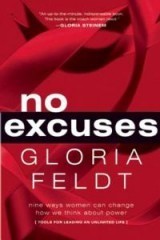 Almost every day, someone asks me, "How did we get to this point?" I tell them the reason is found in the first of the 9 practical "Power Tools" I share in my book No Excuses, "Know your history and you can create the future of your choice."
Almost every day, someone asks me, "How did we get to this point?" I tell them the reason is found in the first of the 9 practical "Power Tools" I share in my book No Excuses, "Know your history and you can create the future of your choice."
While researching No Excuses, I was shocked to find a recurrent approach-avoidance relationship between women and power. I realized it's no longer external structural barriers, real though they are, but internal resistance to embracing power that makes the difference in whether women seek public office, get to the executive suite, or feel able to negotiate their personal relationships.
Doors are open, but women aren't walking through them in numbers and with intention sufficient to transform society's major institutions once and for all – not for at least 70 years at the current rate, and Facebook COO Sheryl Sandberg estimated 500 years to reach parity in corporate America.
Here's The Cliff's Notes History Lesson
Since Abigail Adams asked her husband John to "remember the ladies when the founding fathers were writing the Constitution in 1787 – and the men didn't – women have stood back from "fomenting the revolution" Abigail threatened.
The early women's movement burst forth from the Seneca Falls Women's Rights Convention in 1848 and rightly joined with the abolitionists. Then they were persuaded that gaining legal equality for women was less important than ending slavery, so they deferred.
When the women's suffrage movement resurged in the late 19th century, they had learned their lesson to a fault and refused to include any other social justice issue. So the movement dissipated after the 19th amendment granting women's suffrage was ratified in 1920, instead of consolidating their brief moment of power around a progressive agenda such as peace, childcare, workplace safety, or public health.
Rosie the Riveter went back to the kitchen when Johnny came marching home after World War II. In the 1960′s Betty Friedan liberated us from girdles; today we truss ourselves up in Spanx ™ and obsess about body image because a sexist media narrative tells us to.
Generational Power Paradox
Second wave feminists like me wanted power we didn't have; today, many women have power but don't want it.
I'm talking about women who voluntarily leave the workforce instead of banding together to change workplace policies so they can have a family life and earn a living. I mean women's unwillingness to negotiate aggressively for salary and promotion costs each of us a cool half million dollars on average over our career lifetime.
From the boardroom to the bedroom, from public office to personal relationships, nobody is keeping women from parity any more – except ourselves.
My intent is not to blame, but to inspire women to embrace this historic moment when the doors to power, if not wide open, are at least sufficiently ajar that unlimited possibilities beckon to walk through these passageways boldly and with intention.
Today, I see young women rising up out of their SlutWalks and coming down from their 7-inch heels to march against newly hatched social injustices many had thought as old-fashioned as Sojourner Truth's advice.
Only time will answer the question: Will they embrace their power, know their history, and create the future of their choice?
This article originally ran in a blog post for Women You Should Know. Check it out here along with other women you really should know.
February 24, 2012
Inspiring Black HERStories
February is and March is Women's History Month. This post by Catherine Engh ties the two together in historical context with links to some amazing but little-known women's stories. Wow. Feel free to add stories of other such women in the comment section.
And be sure to check back here often as I continue my annual Women's History Month tradition of highlighting many amazing women—some well known and others not—who have shaped our history. And as you know, No Excuses Power Tool #1 is "Know your history and you can shape the future of your choice."
Janell Hobson, blogger, social critic and professor of women's studies, spotlights the lives of various fierce black women throughout history this February on Ms. Magazine's blog. Hobson's fascinating posts take as subject black female vocalists, vanguards of the second-wave feminist movement, jazz-age expatriates in Paris, fugitive slaves, civil rights organizers and contemporary environmental justice advocates.
Who knew about Sookie, a slave woman who resisted rape by pushing her master into a soapbox filled with boiling water? Or Nannie of the Maroons, a mythic 17th century Jamaican revolutionary who defeated English armies by catching bullets in her buttocks and hurling them back?
"If we ever lose sight of how our past can guide our present and future, as women, as people of color, as the colonized, as the marginalized, then we concede the power of history to others. The many histories without a capital H tell us we don't have to do so–that indeed, we have always had the power to resist." —Janell Hobson
In each post, Hobson familiarizes her readers with complex questions of intersectionality and oppression. How can we build an inclusive feminist movement given past rifts between black women and their privileged white counterparts? How can we represent violence against black women's bodies without reducing them to rape victims or one-dimensional heroic figures (Harriet Tubman, Rosa Parks)?
As Hobson tells the stories of these incredible women, she underlines why and how such stories should be told. The BlackHerStories powerfully reclaim the historical agency of women who are situated within an American history marked by racialized and gendered oppression. Hobson says of the ancestral figures that serve as an inspiration to her: "These spirits are churning, and they are still here." If our understanding of the present is shaped by our understanding of the past—and vice versa—then it is our responsibility to work for knowledge of history that takes into account difference. This series is a good pit stop along that long road.
About Catherine Engh
Catherine Engh is a feminist and an aspiring writer particularly interested in the ways that girls and women are represented in fiction and television. She wrote this piece for 9 Ways—it's a great example of No Excuses Power Tool # 1: Know Your History. Catherine also likes to do as much yoga as is possible—perhaps she'll write about that next.

